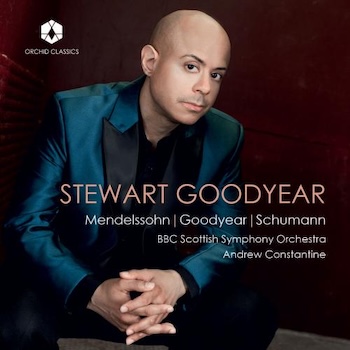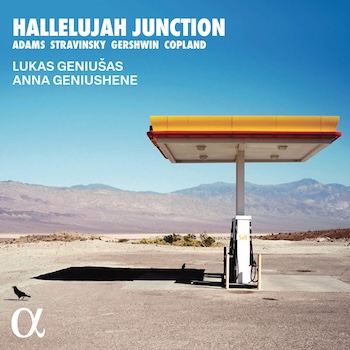Classical Music Album Reviews: Stewart Goodyear and “Hallelujah Junction”
By Jonathan Blumhofer
Pianist Stewart Goodyear livens up a tried-and-true program with works new and unfamiliar; the husband-and-wife team of Lukas Geniušas and Anna Geniushene survey piano music written on these shores, starting in 1932.

Often enough, a performer will aim to liven up a tried-and-true program with works new and unfamiliar. On rare occasions, those selections might be of their own creation.
Stewart Goodyear is just such an artist and, in recent years, he’s been showcasing his own compositions alongside those of established masters. The Canadian pianist’s latest release continues the trend, pairing two of his own works with piano concertos by Robert Schumann and Felix Mendelssohn.
As it happens, Goodyear’s approach to the disc’s standard fare stands tall on its own —and that’s no small accomplishment. His account of Schumann’s evergreen effort is fresh and original, less heroic than usual and, especially in the first movement, naturally illuminates the music’s nervous, rhapsodic qualities. The finale, dry and droll but full of feeling and spirit, is an utter, dancing joy.
His playing in Mendelssohn’s G-minor Concerto (No. 1) is full of tempestuous urgency, but it’s never frenetic, even as Goodyear leans a bit into the beat. The outer movements’ runs are terrifically clean, while the warm, songful Andante benefits from the Toronto native’s feather-light touch.
In both works, Goodyear is joined by the BBC Scottish Symphony Orchestra and Andrew Constantine. Though the ensemble sounds a bit tonally dull in the Mendelssohn, the group plays with vigor. Their contributions in the Schumann are more closely matched, especially in the Intermezzo, which unfolds as an enchanting dialogue.
Though these concerto interpretations need no help, the disc’s other items — Goodyear’s Rhapsody and Introduction & Rondo capriccioso, both of them for solo piano — prove impressive.
In the former, which Goodyear describes as “the most intimate piece I have ever written,” a series of songful, spirited, and ecstatic moments alternate. Clearly shaped and smartly directed, the music’s seven minutes pass by in a gripping flash.
The Introduction & Rondo capriccioso follows suit, with a ruminative introduction ceding way to a bustling main body. The work of a virtuoso writing for himself, it is a wild, explosive ride, and exhilarating to hear canned (as it were). One can only imagine what a thrill it must be to experience this music — all of it — with this pianist, live.
 Given the challenge — especially prevalent these days — of defining what it means to be an “American,” there’s no surprise that, musically, the topic offers no cut-and-dried solutions. Still, the husband-and-wife team of Lukas Geniušas and Anna Geniushene isn’t daunted by the challenge in Hallelujah Junction, their survey of piano music written on these shores over a period over 65 years, starting in 1932.
Given the challenge — especially prevalent these days — of defining what it means to be an “American,” there’s no surprise that, musically, the topic offers no cut-and-dried solutions. Still, the husband-and-wife team of Lukas Geniušas and Anna Geniushene isn’t daunted by the challenge in Hallelujah Junction, their survey of piano music written on these shores over a period over 65 years, starting in 1932.
Granted, their playlist is not a picture of musical diversity: the duo’s selections are by six white men — and well-traveled ones, at that. Even so, their program gets a lot right.
Two numbers, George Gershwin’s Cuban Overture and Aaron Copland’s El Salón México (heard in Leonard Bernstein’s four-hand arrangement), pay tribute to the profound influence of Latin rhythms and colors on wider American musical traditions. Colin McPhee’s Balinese Ceremonial Music makes a beguiling nod to Southeast Asia, while Frederic Rzewski’s Winnsboro Cotton Mill Blues channels the US’s greatest home-grown musical form. The remaining fare — Igor Stravinsky’s Dumbarton Oaks and John Adams’s Hallelujah Junction — abstract various elements from those works and reconfigure them onto larger canvases.
All of the album’s performances are delivered with incisive energy and dry spirit: the Geniušas-Geniushene duo is nothing if not well-matched, musically. Their textural clarity pays dividends in the Stravinsky and Adams selections, which are both compellingly done and evince a clear understanding of where the music needs to go next.
The Rzewski, too, emerges as a masterpiece: dark and menacing, but also inexorable and hypnotic, especially at its lyrical climax. Bernstein’s setting of the Copland comes off impressively, with its crisp, slicing rhythms and seeming anticipations of Adams’s much later style standing out in this reading.
McPhee accomplished the latter, too, with his repetitive phrase structures (like Stravinsky, he was a naturalized American citizen). Though the Montreal-born composer is a bit of of an outlier in this set, the bright, pealing textures of his Indonesian tribute offer a welcome chaser to the Winnsboro Cotton Mill Blues’ grittier hues. Gershwin’s curtain raiser allows the duo to strut their rhythmic sensibilities, though transitional spots sometimes bog down and the music’s up-tempo sections feel a hair too slow.
Nevertheless, there’s more than a bit to chew on here, especially as hooded thugs round up dark-skinned “undesirables” and an American president mobilizes the military to face down protesters in the streets. Leave it to a couple of Russian natives to thoughtfully remind us that, contrary to what some would have us believe, the US has never existed in a vacuum or been some sort of lily-white paradise — culturally, musically, or otherwise.
Jonathan Blumhofer is a composer and violist who has been active in the greater Boston area since 2004. His music has received numerous awards and been performed by various ensembles, including the American Composers Orchestra, Kiev Philharmonic, Camerata Chicago, Xanthos Ensemble, and Juventas New Music Group. Since receiving his doctorate from Boston University in 2010, Jon has taught at Clark University, Worcester Polytechnic Institute, and online for the University of Phoenix, in addition to writing music criticism for the Worcester Telegram & Gazette.
Tagged: "Hallelujah Junction", Alpha, Anna Geniushene, Lukas Geniušas, Orchid Classics

